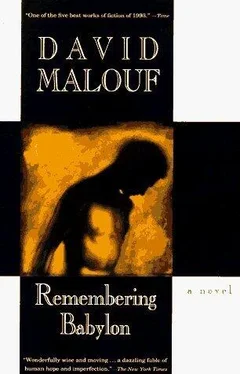The delays went on, their money dwindled; they had to take cheaper lodgings where they were separated into dormitories, male and female, and still there was no sign of the land they had been promised. At last, when it was clear that they could expect nothing of others and must act for themselves, they left Brisbane for the Darling Downs, he to work as a general hand on a big holding, she as a housemaid. And Jock, in his disappointment, his shame too, perhaps, at having promised her so much and provided so little, began to refine in himself the stringy, hard-bitten qualities of dourness and harsh self-discipline that the land itself appeared to demand, and which, for all the fierceness of its own sunlight, dashed out the last of sunniness in him. She had Janet, then lost a little boy, then a girl. They stuck it out, saved what they could, and when land was opened in the unsettled districts beyond the Burdekin, came north. She had left more of herself than she dared consider in the rooms of the homestead whose wide verandahs she had scrubbed and in the copper where week after week, on Mondays, she had boiled the household wash; most of all in the two small graves she knew she would not see again, under the black soil in the grove of bunyas.
Jock, harder than ever now, since more was at stake, dealt sternly with himself and with the children too, Meg when she came, then Lachlan. She saw the last of his youth burned out of him in the hot, bushfire summers up here, when the whole sky, for days on end, was a glowing furnace. And it was to recall a little of his old light-hearted gallantry then — for her own sake, as well as his — that she would tease him about the girls she had won him away from; she knew their names from her brothers — Annie McDowell, Lettie Davidson, Minnie Kyle — happy to see, for all his protests, that it pleased him, woke some spark of his old shy devilry in him, to be taken back to his youthful conquests and the fair lad who had had to dip his head, that first time, silly-drunk as he was, at the door of their parlour. In time this teasing became a show to amuse the two little girls, but also to give them a glimpse of some other side of their stern father. They loved to hear the names — there were so few names in their lives.
‘What was she like,’ they would insist, ‘Lettie Davidson? Tell about Lettie.’
‘Oh, ye’ll hae t’ask yer faither aboot that,’ she would tell them. ‘Ah never clapt eyes on the huzzie. Tell them, Jock.’
He looked foolish. ‘Get awa’ wi’ ye, thir wasnae ithers,’ he told her.
‘Keep me!’ she’d laugh, ‘sic lees the man tells. Look at the colour of him. Look at yer faither and see what lees a man can tell.’ It relieved him.
He was often homesick though he did not say so. The land here never slept. If only he could wake one day and find it, just for a day, under a blanket of snow! What he missed were the marks of change. The crying, high up, of curlews flocking to a new season, to some place thousands of miles to the north where it had been winter and was now breathing the freshness of spring, brought an ache to his heart for the sight of rowans just bursting into sticky leaf, and for days afterwards he would be rough-tempered, as if the need of bark for the shiver of radiance was in himself.
She could not afford such surrenders. Her nature was less volatile than his, less prone to extremes. Occasionally, washing an old frock with a pattern of larkspurs, all their lively colour gone to grey, she would experience a little pang at the thought that she might never again see one. She had chosen the print, years ago, because she had loved so much their vivid blue. But she had few regrets for the world she had left — perhaps because she had none at all for her youth. She lived in the demands of the moment, in the girls, in Lachlan, and was too high-spirited, too independent, to care whether other women approved of her.
They came in the afternoon with their bits of darning. As the needles went in, they lowered their eyes and put their questions, all barbed concern.
Gemmy, it was always Gemmy. What had they talked of, she wondered, before Gemmy arrived to give that breathless urgency to their talk and to darken the air in the close little hut to a point where she wondered, sometimes, how even by screwing their eyes up they could find the hole to thread a needle, the room was so dense with the shadows they called up to terrify themselves and one another.
Didn’t she find it hard sometimes to sit at the same table with him? Considering that he might be happier running about naked — goodness, remember that first day! — than in the shirts she washed for him. Oh and the trousers, of course! And eating grubs — imagine! — than potatoes and cold mutton. That is, if it wasn’t something worse. Their own grandfathers, so they say. And wasn’t she scared, just a little — well they knew she wasn’t but they would be, it was a wonder really how calm she was — of the time he spent with the children. The little girls, for instance. And Lachlan, who was so lively and impressionable? Wasn’t she worried sometimes about the influence the fellow might be having? And did she really let him chop wood for her? Actually let him loose with an axe ?
The word assumed substance, took shape, and you heard the swish of its blade through the stilled air in the suspension of their breath. Gracie Corcoran, who was a Roman, crossed herself.
They were forgetting, she told them frostily. Gemmy was white.
She despised these attempts to undermine her. What especially enraged her was the suggestion that she might not have her children’s safety at heart. She would not let them see how they had unsettled her. Calm. Is that what they thought?
They were in a place where there were no sureties of any kind. Of course she wasn’t calm! And of course there were times when she was not just scared but petrified, though for the most part she was not, and these weaker moments she kept to herself.
You took slow, shallow mouthfuls of air till the fear drew off.
You took it for granted that life would stay normal, and if you believed that hard enough, it did. Three meals on the table, plates drying on the rack, a wash on the line, shirts, children’s things, empty for now but ready to be drawn over your head and stepped into, and hooked and buttoned and soiled and sweat-stained in the time to come.
But there were nights, lying stiffly in the dark, hands clenched at her side, heart thumping, when she did not feel sure.
She was aware of the three children breathing in the dark, two of them her own, the third a sacred trust; the notes of their breathing as different, as distinct one from the other, as their voices, or their bright, quick bodies. What would become of them? What sort of life could they have up here?
She had wanted to give Lachlan a better chance than he might have got at home, but he was wayward, he could go any way at all in this country that was all fits and changes, one thing one minute, another the next. There was no way of telling. Was Gemmy really an influence on him?
It was now, in this loose state at the edge of sleep, or, worse still, of despairing sleeplessness, that her neighbours’ doubts took possession of her.
Her mind strayed to where he was sleeping, curled up under a red blanket in his lean-to against the side of the hut; just inches away, the other side of the wall.
Occasionally, in the deep hours, a cry would come from him. Jock would start awake, his hand already feeling for the shotgun; one of the children, stirring, might speak as if in answer, then a second.
She would lay her hand to her husband’s arm. He would settle, the child would settle. She would lie there, reaching for breath; wondering what dream out of the dark world he had lived in had come back to claim him or he had gone to meet; which in the open, unguarded state you fell into when consciousness lapsed might have the power to cross from one head to another, to her husband’s familiar one on the pillow beside her, where he slept on his back with his mouth open and his fists lightly clenched above his collarbone, or into the fair head of one or other of the children where a pallet shifted with a rustling of shucks.
Читать дальше












